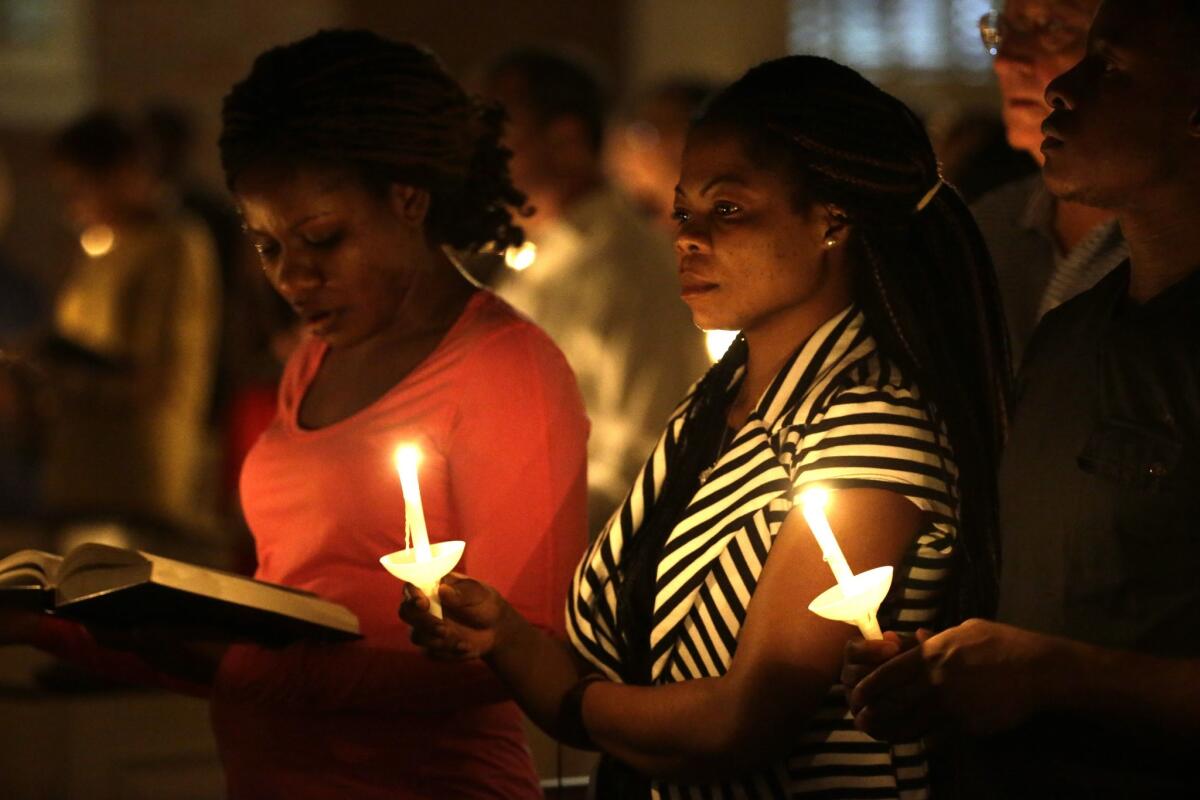Mourners gather in Dallas to remember Ebola victim Thomas Eric Duncan

- Share via
Reporting from Dallas — Several hundred mourners gathered at Wilshire Baptist Church late Wednesday to remember Thomas Eric Duncan, the first Ebola patient diagnosed on U.S. soil and the fiance of a church member.
Duncan, 42, died Wednesday morning, about 10 days after he was hospitalized in Dallas with the deadly virus. He had come from Liberia to marry Louise Troh, who bore his son 19 years ago. Troh and three others who shared a Dallas apartment with him remain in quarantine while authorities monitor them for symptoms of Ebola.
After careful preparation, Duncan’s body will be cremated, state health officials said. According to guidelines from the U.S. Centers for Disease Control and Prevention, Ebola victims’ bodies can be sealed in two bags, which are disinfected before transport. That eliminates the need for protective gear for drivers and others in close proximity.
No funeral arrangements have been announced for Duncan, who went by Eric.
Saymendy Lloyd, a friend of Troh, was among the mourners. “We’re just here to memorialize Eric as best we can,” she said.
Troh, 54, remained in isolation at a Dallas home with her 13-year-old son, one of Duncan’s relatives and a family friend. None has shown symptoms, Lloyd said.
Lloyd said Troh was frustrated with the medical care Duncan received at Texas Health Presbyterian Hospital in Dallas. He went to the ER the night of Sept. 25 with a slight fever and was sent him home with a prescription for antibiotics. He returned by ambulance three days later and was hospitalized in isolation until he died.
“Her view is there are people in Liberia who are being rescued and treated better,” Lloyd said.
The World Health Organization says more than 3,400 people have died of Ebola in West Africa, where hospitals are overfilled and overwhelmed. Many victims die at home or in the street.
Lloyd has been trying to comfort the son of Troh and Duncan, 19-year-old Karsiah Duncan, a student at Angelo State University in San Angelo, Texas.
Karsiah Duncan, who also goes by Eric, had invited his father to Texas this summer to attend his high school graduation. The visa didn’t come through until August, relatives said. He had not seen his father since he was 3 years old, when he and his mother immigrated to the U.S. The elder Duncan stayed behind in Africa.
On Wednesday, Karsiah Duncan told Lloyd he wished his father had not come.
His father told his mother the same thing after he was diagnosed with Ebola on Sept. 30, Lloyd said.
Lloyd tried to persuade Karsiah that his father didn’t die in vain, that his case increased awareness of the disease nationwide, that “America would never be the same because of his father.”
But that’s cold comfort to a 19-year-old whose father died before he could visit him at the hospital, and whose brother and mother remain under observation until Oct. 19. His sister, who cared for Duncan before he was hospitalized, also is isolated at home along with her four children. All are being monitored for Ebola symptoms.
“He doesn’t know what is going to happen to his mother, where he is going to go from here,” Lloyd said before taking her seat in the front pew with leaders of Dallas’ Liberian community.
Troh’s pastor, the Rev. George Mason, told mourners that the service was being live-streamed so Troh and her family could watch from seclusion.
“We love you and we are praying for you,” Mason said.
Mason encouraged the diverse crowd not to see Duncan’s death as a reason to withdraw in fear, but to reach out in love to those in need.
He had visited with Troh earlier in the day, and she passed on memories of Duncan for him to share.
“Eric wanted to come to this country, he wanted them to be a family, he wanted to work hard so that they could return to his country,” Mason said.
Troh described her fiance as “a Christian man, a quiet, generous human being.”
“She said he knew how to talk to ladies,” Mason said, eliciting chuckles from the crowd. “He didn’t let anyone use bad language around women. He cared for his children and wanted the best for them.”
Including his only son.
“The last words Eric Duncan said were said to a nurse. She asked him what he wanted, and he said he wanted to see his son,” Mason said. “That dream died with Eric Duncan.”
Twitter: @mollyhf
More to Read
Sign up for Essential California
The most important California stories and recommendations in your inbox every morning.
You may occasionally receive promotional content from the Los Angeles Times.











